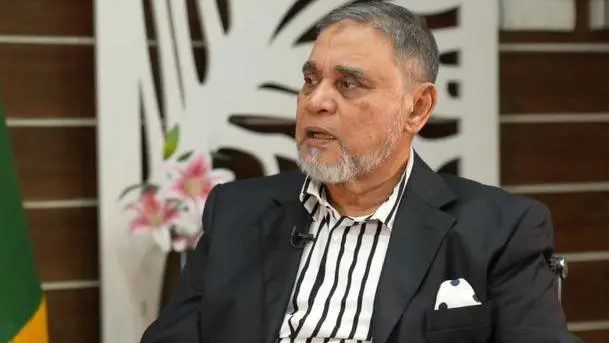Chief Election Commissioner AMM Nasir Uddin has said the Election Commission (EC) has yet to receive any formal communication from the government about the date of Bangladesh’s next national election, but is independently preparing for a likely vote between February and April 2026.
Speaking to BBC Bangla in an exclusive interview, Nasir Uddin admitted, “It’s very difficult for me to respond because I myself don’t know the exact date.” He said the commission has only heard unofficially that the election might be held before Ramadan — which would place it in early February. “That’s our assumption,” he clarified, underscoring that no official directive has been issued so far.
Despite the uncertainty, the EC has been actively preparing since day one of his appointment. “We began our preparations targeting December,” the CEC said, referring to Chief Adviser Muhammad Yunus’s 16 December 2024 speech, where Yunus suggested that the election might be scheduled for either December 2025 or June 2026.
However, with Ramadan expected in late February, the EC is now leaning toward an early February window as its operational focus, unless instructed otherwise. The delay in formal notification has drawn concern amid growing public and political demand for a clear electoral roadmap.
While awaiting government direction, the EC continues its groundwork to ensure it is ready for any timeline. Nasir Uddin reaffirmed the commission’s resolve to conduct a free and credible election whenever the date is officially announced.
No guidance from the government
The Chief Election Commissioner clarified that the EC is receiving no instructions or guidance from the interim government regarding election scheduling. “We are taking preparations absolutely independently,” he said. Even when Nasir Uddin met the Chief Adviser recently, it was a courtesy call, not a formal meeting or agenda-based discussion.
He explained that although election matters were naturally discussed during that meeting, the CEC deliberately avoided asking about a possible date. “It would not be advisable to ask him that. Political parties have different preferences—some want early polls, others want delays. I did not want to place him in an awkward position.”
Electoral neutrality and perception
Addressing allegations of bias, especially from the National Citizen Party (NCP), the CEC firmly asserted the EC’s neutrality. “Of course, we are neutral. I made that commitment when I took oath on the balcony of the Supreme Court,” he said. He also had EC staff take a pledge during Voter Day on the first day of Ramadan to conduct a free and fair election.
In response to claims that he is sympathetic to the BNP, or even to Jamaat-e-Islami, Nasir Uddin dismissed them as political rhetoric. “I am not a member or leader of BNP. These are political statements. People have the right to say such things, but they’ll realise over time that we are neutral through our actions.”
On Dhaka South mayoral verdict and political reactions
Asked about the controversy surrounding the Election Commission’s issuance of a gazette appointing Ishraque Hossain as mayor of Dhaka South, the CEC clarified the decision was based on a directive from the election tribunal under local government law. “We can’t be partisan about a decision from a court we ourselves constituted.”
He believes any misunderstanding from the government regarding this verdict has since been resolved. “They now understand that this was required by law, and our explanation has clarified the matter.”
Awami League ban and inclusive polls
On the suspension of Awami League’s political activities pending trial, the CEC said their registration has been frozen. “If they cannot engage in political activity, what’s the point of their registration? We’ve suspended it accordingly.”
Asked whether this would compromise the inclusiveness of the election, he acknowledged, “That question is natural. But our concern is voter participation. Definitions of ‘inclusive’ vary from person to person.” He hopes that Awami League supporters will participate as voters even if not as candidates.
On former CECs’ arrests and misconduct allegations
The CEC declined to comment on the legal cases involving former election commissioners, citing judicial sub judice. However, he did criticise the public humiliation of one former CEC, who was paraded with a shoe garland. “No one supports such acts. Those responsible have been arrested. I believe due legal process will prevail.”
Local polls not on the table before national election
Although some are calling for local elections ahead of the national vote, the CEC said the EC is not considering it realistic at this time. “Local polls are violence-prone and must be held in multiple phases, requiring 10 months to a year. That’s not feasible before the national election,” he said, pointing out that the Chief Adviser has not mentioned local elections in any of his statements so far.
Symbol controversies and registration process
Regarding party registration, Nasir Uddin said the EC is verifying the applications of around 150 political groups. He assured the process would be completed on time, with the help of 5,700 field-level EC personnel. He also confirmed that the controversial water lily symbol (‘Shapla’) will not be granted to any party, citing legal and procedural concerns. Both the NCP and Nagorik Oikya had requested it.
On Jamaat-e-Islami’s iconic scales symbol, he said the party’s reinstatement was compelled by a Supreme Court ruling. “Their registration was revoked along with the symbol. Now that the registration is restored, so is the symbol by default.”
Vision and legacy
Asked about his legacy, CEC Nasir Uddin said he took the position as a final challenge in his career. “At this critical juncture, I hope to give something back to the country. I entered with a smile, and I want to leave with a smile.” He said the Election Commission will succeed if all institutions, including law enforcement, work together.


